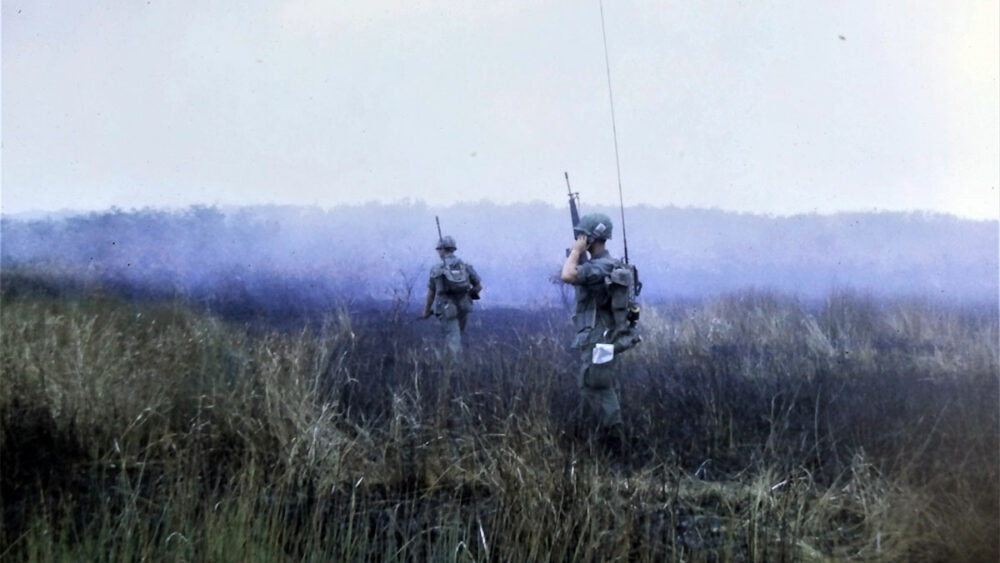COLUMBIA, S.C. – For Glen Inabinet, serving as a soldier in Vietnam, 1969-70, was just one new experience after another – experiences for which he had not been trained.
He had trained as an artilleryman. After he arrived in IV Corps, in the Mekong Delta south of Saigon, he did that for about a week or 10 days before being “volunteered” to become a radioman as part of the artillery’s forward observer team embedded with the infantry. That was just the beginning of his surprise experiences.
But he survived it all and made it back to his wife in South Carolina, and at noon on Friday, Oct. 21, he will tell the whole story of his Vietnam service at the South Carolina Confederate Relic Room and Military Museum. The program, which is free and open to the public, is part of the museum’s monthly Lunch and Learn program.
Things started not going as expected early on, back stateside. He left the University of South Carolina and enlisted in the Army, thinking he would go to Officer Candidate School after basic training at Fort Jackson. The first surprise was that he was sent to Fort Leonard Wood in Missouri instead of Fort Jackson right next door to home. After that he went to artillery school at Fort Sill, and soon after that decided he didn’t want to spend the extra year in the Army that OCS would entail.
Next stop Vietnam, in March 1969.
For the first few days, he did what he had trained for, firing artillery rounds from Firebase Tan Tru. During that brief period, he knew nothing of the war out in the places where the 105 rounds actually landed. Then, the forward artillery observer needed a new radio operator. Glen was given the chance to volunteer. Knowing nothing about radios, he declined. He got “volunteered” anyway, and became part of a three-man team – the Forward Observer officer, the recon sergeant and the radio-telephone operator, or RTO – who would be flown and dropped among the enemy in the place where the artillery rounds would soon be landing. No one ever told him what had happened to the RTO he was replacing.
That wasn’t the end of the novelty this new job offered. The three-man team would be flown in by helicopter – except nights, when they sometimes went in by Tango boat – and Glen had never ridden on a helicopter in his life. He would soon grow accustomed to it. Initially, the experience was quite pleasant, up out of the unbelievably humid heat on the ground – “It was like being air-conditioned,” he found.
Then came the hot part, after the chopper would lose altitude on its way into the landing zone. Glen would learn by personal experience that “hot LZ” didn’t just refer to the humidity. When that term was used, it meant the enemy would be firing at them when they landed. Usually, the Huey didn’t bother landing – it dropped the team from about five feet off the ground. Once, they were dropped that way into a hot zone in a rice paddy – probably from the usual height, although it seemed much higher. Whatever the altitude, he sank thigh-deep into the mud. Normally, that would take a while to get out of, but under enemy fire he took little time heading for cover.
He did that for about five weeks, then, just as suddenly as he had unexpectedly become combat radioman, he was brought back to the firebase to serve as the TAERS – the Army Equipment Records System – a job in which he was charged with keeping track of all the battery’s equipment, including guns and jeeps. He sat in a tiny office in charge of big, metal-jacketed books, in which he recorded any time someone checked out, say, a jeep. And no, he had no training at all in the TAERS system. But in Vietnam, he got a lot of on-the-job training.
Anyway, he did that the rest of his tour, went home to his wife, and then taught U.S. history for more than 30 years at Camden High School.
He was glad to make it home in one piece. He figures he had a little bit of an advantage, though. Unlike the 17- and 18-year-old kids who went in, he was married and had been to college, and was already 25. By that time, he says, he “had all of the wild hairs combed out – I was more grounded.” The kids might have been a little more physically fit, but he was better-prepared mentally. He went over determined to “keep my head down, and try not to take any foolish chances.”
He’ll tell all about how that worked out at the museum on Friday.



Comments are closed.